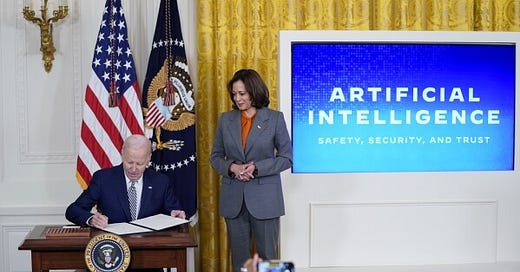Uncle Joe to AI: Hold your horses, Sonny Jim
Everything you wanted to know about the new AI executive order but were too busy watching the Golden Bachelor to ask
Uncle Joe and Aunt Kamala, signing the AI executive order. Source: AP.
Joe Biden's White House has released its long awaited Executive Order on Artificial Intelligence, and the reviews are in:
"This Executive Order represents a remarkable, whole-of-government effort to support the responsible development and governance of AI. " — Alexandra Reeve Givens, CEO of the Center for Democracy and Technology
"While the Executive Order is undeniably comprehensive, its efficacy hinges on how stakeholders respond to it, especially given the rapid expansion of AI use cases." — Titilola Afolabi [1], Data privacy and technology law attorney
"While the order makes important strides, such as requiring agencies to protect civil rights and civil liberties in any use of AI in governmental programs, it also fails to meaningfully address AI use in national security and offers insufficient protection from law enforcement uses of AI." — The ACLU
“I'm sorry, were you saying something? I was busy watching The Golden Bachelor.” [2] — The rest of America
I know. Nobody has time to read A 2000+ word executive order filled with bland bureaucratese. And because I’ve decided to devote my copious leisure time writing about AI and looming dystopia [3], I guess that job falls to me.
[UPDATE: Turns out that was just the summary of the executive order. The actual EO runs to more than 100 pages. That is definitely tl;dr. I love you, dear readers, but there are limits.]
Here are the answers to the questions you haven't asked, but I know you want to.
What's in the damned thing?
A lot. The executive order covers the gamut — really, the Biden Administration deserves kudos for digging up nearly all the potential landmines around AI — but a few things stand out to me.
1. Labeling AI-generated content. "The Commerce Department will develop guidance for content authentication and watermarking to clearly label AI content." But this only applies to communications coming from the US government. They're hoping to establish a standard other organizations will follow.
[UPDATE: As Casey Newton points out in his Platformer substack column, Biden invoked the Defense Production Act with this order. DPA is a cold-war-era law that gives POTUS expanded powers to tell private industry what to do. It was invoked by Biden and The Former Guy to compel companies to expedite production of medical supplies and vaccines during the height of COVID. That gives the EO more teeth than I had originally thought; how sharp they will be remains to be seen.]
2. Prioritizing privacy. "Strengthen privacy-preserving research and technologies," and "evaluate how agencies collect and use commercially available information." In other words, use technology like encryption to protect personally identifiable information. And while 'evaluate' is not the same as 'prevent,' it's a start.
3. Minimizing bias. "Address algorithmic discrimination" and "ensure fairness throughout the criminal justice system" when using AI. This is key; any AI that is trained using existing criminal records and police activity will simply carry forward discriminatory policies we've suffered under for the past 200+ years.
4. Supporting workers displaced by AI. "Mitigate the harms and maximize the benefits of AI for workers" and "identify options for strengthening federal support for workers facing labor disruptions." This is hinting — just barely — at the notion of 'Universal Basic Income,' where people who've been replaced by robots receive a monthly check from their Uncle in DC.
5. Keeping AI from going rogue. "Develop standards, tools and texts to ensure AI systems are safe, secure, and trustworthy." It calls on the Department of Homeland Security to establish an AI Safety and Security Board to evaluate risks of new AI models. It's not clear to me whether this also includes AI tech developed by the Department of Defense or other three-letter federal agencies, but let's hope it does.
It's good to keep in mind that the language in the EO is full of words like "evaluate," "establish standards," and "ensure best practices." In other words, now that they've dug up the landmines, they still have to figure out how to defuse them.
Why an executive order?
Have you seen our House of Representatives lately? It's a clown car crashing into a dumpster fire on the deck of the Titanic. When one side of the House is too busy trying to party like it’s 1899, an executive order is the best we can hope for.
Executive orders can giveth (Lincoln's Emancipation Proclamation) or taketh away (FDR's EO that established internment camps for Japanese Americans). [4] They can also be overturned by Congress or the courts. [UPDATE: EOs can also be revoked by the next occupant of the Oval Office.]
The vast majority of them are obscure, but some are historic. Jury is out on this one.
Who is bound by EOs?
The executive branch and federal agencies. POTUS is their boss. Gotta do what bossman wants, or there be hell to pay.
Amazon, Google, Meta, and all the other American AI giants are not bound by these rules, but they need to play by them if they want do business with the US government (and they do). Last December, for example, the Pentagon awarded $9 billion in contracts to Amazon, Google, Microsoft, and Oracle for cloud computing services.
And, of course, the rules don't apply to any AI companies outside the US (like China's Alibaba, Baidu, Tencent, etc). But again, they could impact companies that want to do business in the US.
Why is it so vague?
That's actually on purpose. Regulating technology is tricky, and Congress often gets it wrong. You don't want to be too prescriptive — imagine a law that requires all US companies to communicate with customers via fax, for example. Probably sounded like a great idea in 1980.
New technologies can emerge and become obsolete in the time it takes Charles Grassley or Mitch McConnell to finish a sentence. So, like the Pirate's Code, the EO is more like what you'd call guidelines than actual rules.
What happens if people ignore it?
And by "people," I assume you mean Elon Musk?
Private companies that have no interest in siphoning off those sweet US tax dollars can still do whatever they damned well please with AI, at least for now. The hope is that they will be in the minority and isolated by companies that decide to play by the rules.
On the other hand, if there's no enforcement mechanism (criminal or civil penalties) people can and will flout the rules. My guess is we will still need legislation of some kind, and it will have to happen at the state level.
My take overall: The EO is a good thing. But the devil is in the details. Whether this results in meaningful guardrails around AI development is yet to be determined.
Tune in next time for a deep dive into the Epic of Gilgamesh.
What's your take on government regulation of AI? Are you pro, anti, or just 'meh'? Offer your in-depth analysis in the comments below.
[1] This is now my all-time favorite name. Say it with me: Titi-lola-Afo-labi. Also, she's right.
[2] My money is on Faith — she's a saucy little minx.
[3] Why? is the question I ask myself at least two times a week, usually on Tuesday and Friday mornings.
[4] FDR holds the all time record for executive orders by a president, issuing a whopping 3,728 during his 13 years in the big chair. So far, Biden is up to 125. The guy who previously sat in his chair issued 220, most of them written in Sharpie.






I'm an in your debt for your reading of the EO! AND, for the first time since I subscribed -- I'm not leaving my reading of your blog with low-grade, suicidal fantasies.
As I've been writing in other venues and to other audiences: our country is so much better off under Biden. He's not just been a good President, but I'd argue, a great one, especially when you consider what he inherited (remember, COVID?) and what he's been battling every single day in office (at home—MAGA Repubs in Congress, state governments AND the Courts, and overseas? Bond-like villains out to destroy our democracy)!
He's been so damn productive and effective on so many fronts. Record low unemployment, record low uninsured rates, record low poverty rates, biggest ever climate action, massive investment in roads, bridges, broadband, and huge uptick in manufacturing (high tech/renewables), plus where the hell is that recession the media was predicting since before the midterms?
The list goes on, add this EO on AI...nice Dark Brandon...nice.
BRAVO! and thanks for reading the whole thing!